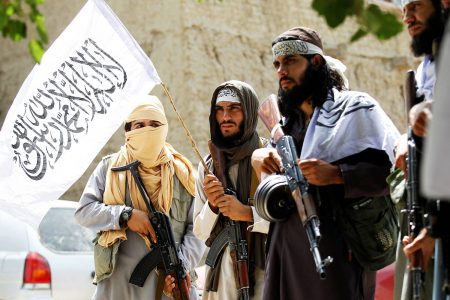
Taliban terrorist group maintains ties with Al-Qaeda despite the U.S. peace deal
The Taliban has maintained close ties with al-Qaida, according to a recently released U.N. report, suggesting the Taliban is undermining its agreement with the United States to sever all relationships with terrorist organizations.
Released Monday, the U.N.-mandated report on the threat of the Taliban and other such groups to the peace, stability and security in Afghanistan said the Taliban, especially its Haqqani Network, remains close relations with al-Qaida based on friendship, a history of shared struggle, ideological sympathy and intermarriage.
The report said al-Qaida leadership is in Afghanistan and has been “quietly gaining strength” in the country while operating with the Taliban and under its protection.
According to the report, which was compiled from information from U.N. member states’ intelligence and security services, the two groups have held talks on forming a new joint unit of 2,000 armed fighters split into two operational zones in the country, and that al-Qaida has established new training camps in Eastern Afghanistan.
It also states the Taliban “regularly consulted” with al-Qaida during peace negotiations with the United States that produced an agreement on a path to end the nearly two-decade Afghan war consisting of a drawdown of U.S. troops. In exchange, the Taliban would sever connections to terrorist organizations and begin peace negotiations with the Afghanistan government.
However, al-Qaida “reacted positively” to the agreement’s signing and viewed it as “a victory for the Taliban’s cause and thus for global militancy.” The Taliban also told al-Qaida it would “honor” its historical ties.
The report seemingly contradicts the Trump administration, which has said the Taliban has ended its relationship with al-Qaida.
After the agreement was signed, Secretary of State Mike Pompeo told reporters in Washington, D.C., that “the Taliban must respect the agreement, specifically regarding their promises of severing ties with terrorists” and that they are not required to drawdown U.S. troops “unless they are fulfilling every element of their end of the bargain.”
In an interview early March with CBS’ Face the Nation, Pompeo announced “the Taliban have now made the break” with its historical alley, al-Qaida.
“This is historic in that way,” he said, “and no one should underestimate the Trump administration.”
Zalmay Khalilzad, U.S. Representative for Afghanistan Reconciliation and who signed the February deal on behalf of the U.S. government in Doha, Qatar, told reporters Monday that he has not read the U.N. report but that he was told it does not cover the period after March 15.
“We believe that there is progress, but we will continue to monitor those activities very closely,” he said.
Michael Kugelman, deputy director of the Asia Program at the Wilson Center in Washington, D.C., said that the Trump administration may “underplay” the report’s findings in order to preserve the agreement.
“Despite the U.N. report’s findings, we shouldn’t overstate the strength of [al-Qaida] in [Afghanistan],” he tweeted. “But its continued ties to other terror groups there, including – according to the report – the Taliban, are cause for concern.”
Source: Bakhtar News





